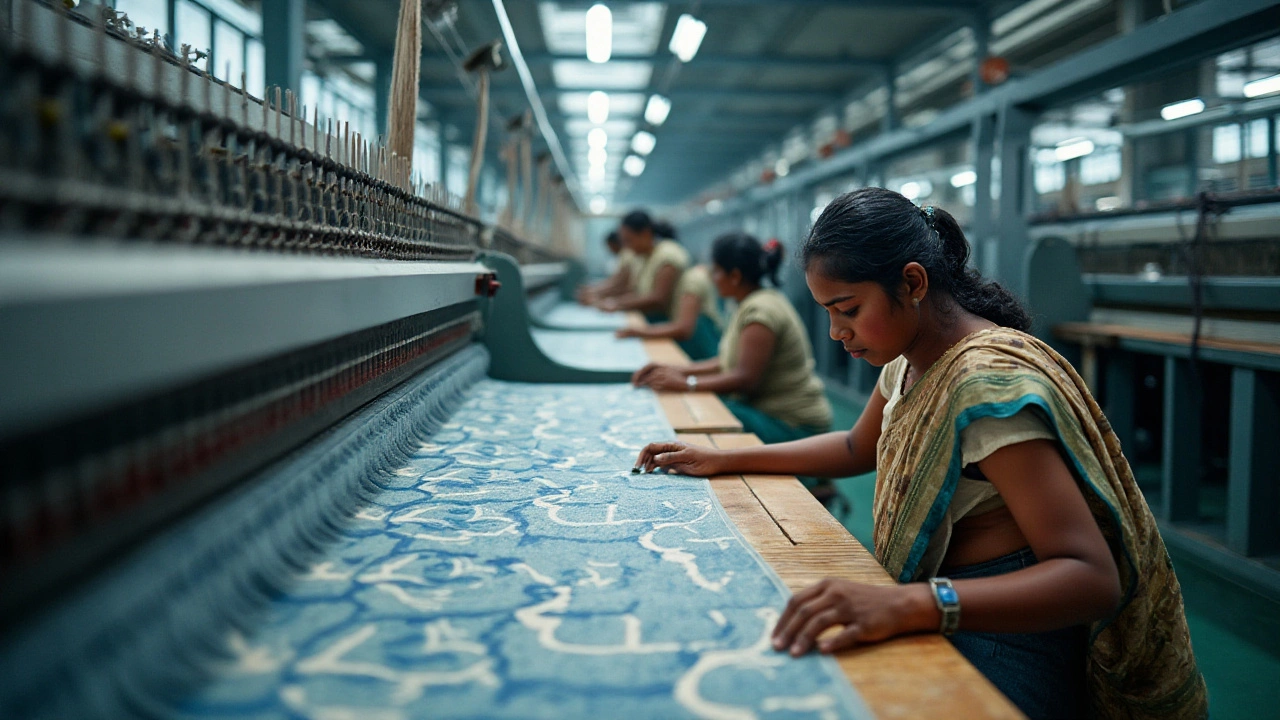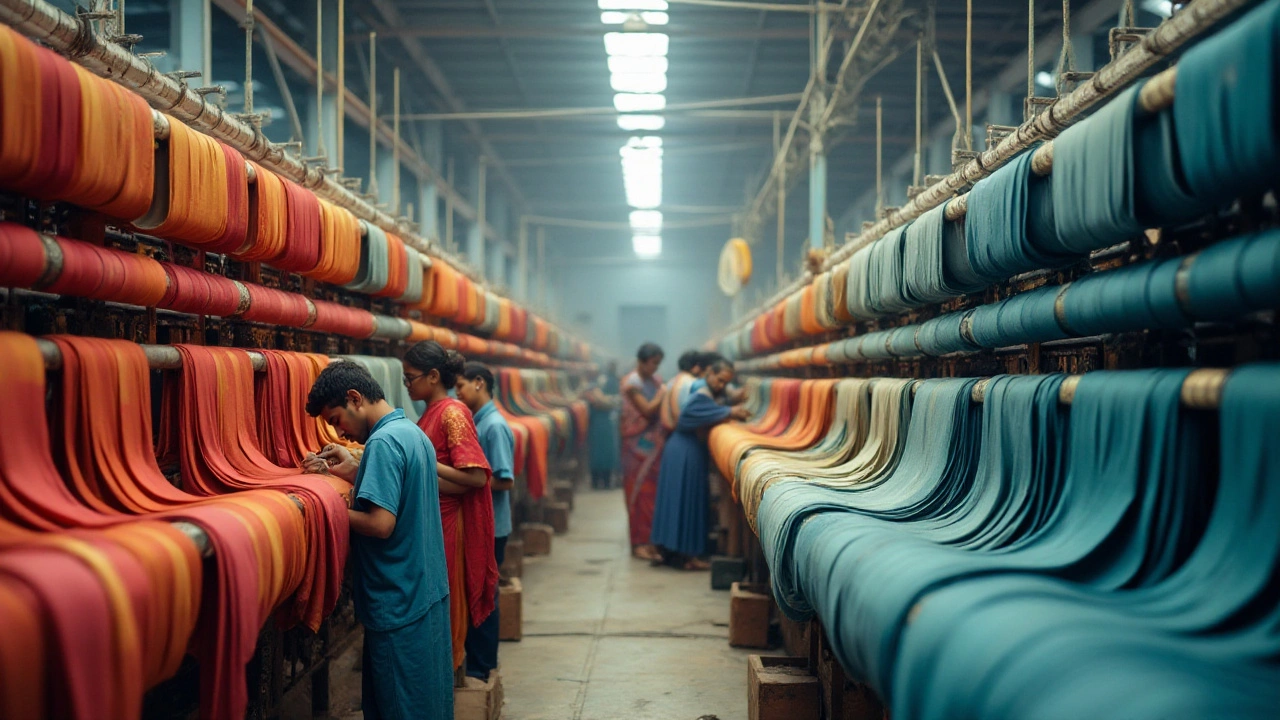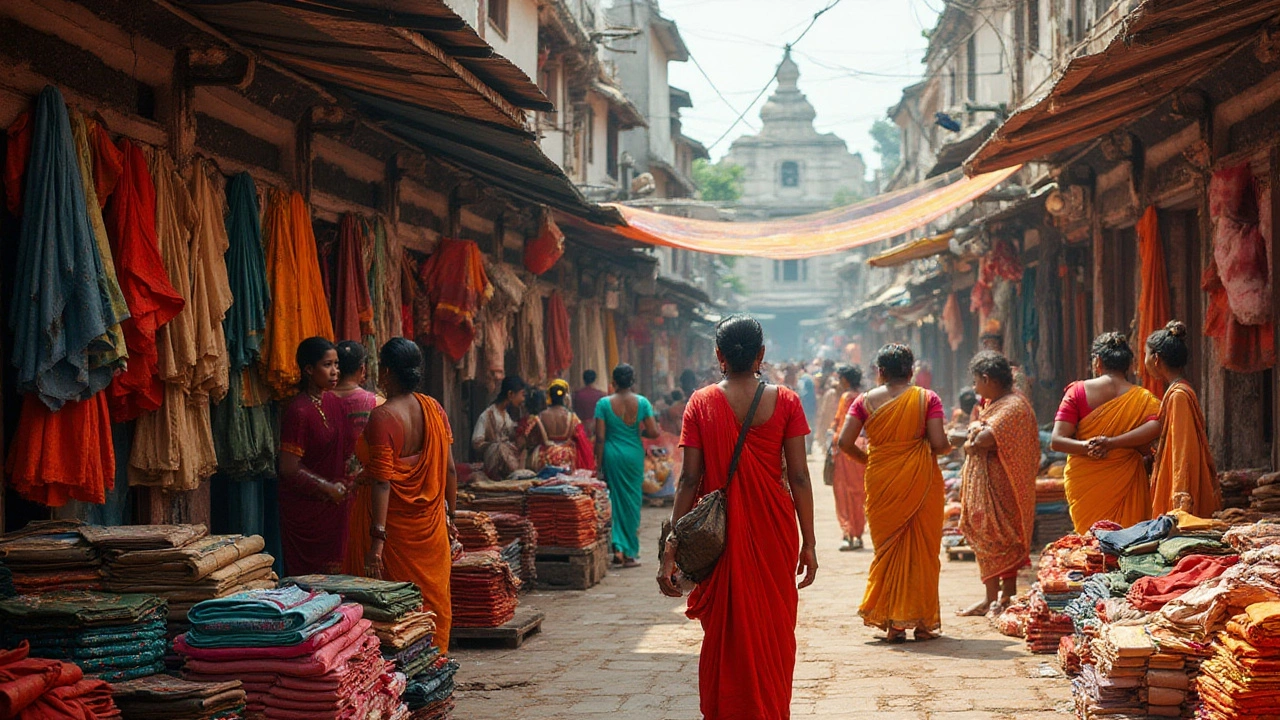India's textile industry is a tapestry woven with tradition and modernity, creating a colorful panorama that captures the imagination. But when it comes to leadership in production, one state rises to the forefront: Tamil Nadu. Known for its thriving textile hubs, this southern state embodies the heart of India's textile operations.
From quaint handlooms to cutting-edge production facilities, Tamil Nadu's textile industry spans a wide spectrum, serving both domestic needs and international markets. With decades of expertise at its core, the state has profoundly influenced India's economic landscape through its robust textile output.
This article delves into the factors that contribute to Tamil Nadu's preeminence, explores key industry players contributing to its success, and considers the economic implications of its leading status. By examining the past, present, and future of Tamil Nadu's textile sector, we uncover how this remarkable entity remains a pivotal force in shaping India's industrial story.
- Overview of India's Textile Industry
- Tamil Nadu: The Hub of Textile Production
- Key Players Dominating the Scene
- Economic Contributions and Impact
- Future Prospects and Challenges
Overview of India's Textile Industry
India's textile industry is not just a reflection of its rich cultural tapestry but also a pivotal part of the country's economic engine. Embracing a vast array of products—ranging from traditional handwoven fabrics to cutting-edge technical textiles—it holds a unique position as one of the largest sectors in the nation. Estimates indicate that the industry contributes about 2% to India's GDP and employs over 45 million people, making it one of the largest sources of employment after agriculture. This ancient craft, which dates back to the Indus Valley Civilization, has evolved dramatically over the years and now ranks among the top textile producers globally.
Several distinctive features define India's textile landscape. First, it is one of the only industries in the world that operates on a complete value chain model—from fiber production (cotton, jute, silk) to manufacturing finished goods like garments and home textiles. This integration not only strengthens the industry but also positions it as a competitive player in the global textile market. The diversity in the types of textiles produced in India is remarkable. Each region has its distinct fabric and craft, from the vibrant banarasi sarees of Uttar Pradesh to the elegant kanjeevarams of Tamil Nadu.
"The textile industry in India has a glorious tradition. It significantly contributes to the economy of the country," said R. C. Bhardwaj, an expert in industrial economics, emphasizing the 'textile manufacturer' as a critical component in the national economic framework.
India's textile exports are noteworthy, making it one of the leading textile exporters worldwide. According to recent statistics, the Indian textile industry's exports reached approximately USD 44 billion in the fiscal year 2022-2023. The country exports cotton fabrics, woven fabrics, garments, and accessories to various destinations, the United States and Europe being notable markets. The government recognizes the strategic importance of textiles and has introduced initiatives such as the Technology Upgradation Fund Scheme (TUFS) and Mega Textile Parks to boost modernization and enhance global competitiveness.
The journey of India's textile industry is a tale of resilience and innovation. Surviving challenges ranging from global competition to domestic impediments, it continues to reinvent itself through digitization and sustainability measures. The infusion of technology into traditional methods has led to the birth of technical textiles, which are expanding applications from healthcare to infrastructure. There is a burgeoning trend towards eco-friendly and organic textiles, responding to global environmental concerns. As the industry ventures further into the 21st century, this blend of tradition and technology promises new opportunities and advancements, ensuring its place as a bedrock of the national economy.
Tamil Nadu: The Hub of Textile Production
Tamil Nadu has long been recognized as the beating heart of India’s textile industry, a title it has earned through both historical legacy and modern dynamism. The state's textile roots stretch back centuries, where age-old practices like handloom weaving met with the rich cultural tapestry of the region. It wasn't just the appeal of tradition that laid the groundwork, but also the foresight to embrace technological advancements in textile manufacturing. Today, Tamil Nadu stands tall as India's largest textile producer, contributing a significant portion of the country's fabric output. The region is home to Coimbatore, also known as the 'Manchester of South India', due to its extensive array of cotton mills, which power this textile juggernaut.
Boasting approximately a third of India's textile production, Tamil Nadu's supremacy comes from a confluence of factors. The availability of raw materials, especially cotton of superior quality, serves as a solid foundation. Couple that with a vast pool of skilled labor, developed infrastructure, and favorable climate, and Tamil Nadu becomes an ideal location for textile ventures. What's remarkable is how the state has seamlessly integrated traditional craftsmanship with state-of-the-art technologies. This means while you can find the finest Kanchipuram saris here, you'll also encounter industries pushing the envelope with synthetic textiles and apparel, making Tamil Nadu indispensable in the sector.
One cannot discuss Tamil Nadu's textile scene without acknowledging the influence of key industry players. Brands like Lakshmi Mills and Bannari Amman have been at the forefront, some having operations that span over a century, constantly innovating and expanding. These companies are not just producers but also trendsetters, often setting benchmarks for quality and sustainability. It's their ongoing commitment to quality and adaptation to global market trends that keep Tamil Nadu's textile manufacturers in high esteem internationally. This resilience is reflected in export numbers, where the state contributes massively to India's global fabric footprint.
Tamil Nadu's Minister of Textiles once noted, "Our state is not just a center for production; it is a hub of innovation. From natural fibers to technical textiles, our vision is expansive."This quote highlights the state's multifaceted approach to textile production. Indeed, Tamil Nadu is now venturing into technical textiles, leveraging its existing strengths to explore markets like medical textiles and geotextiles, which are expected to see massive growth in coming years. This diversification is crucial not only for maintaining its leading position but also to provide ample employment opportunities to its population.
Looking at the numbers, Tamil Nadu's textile industry employs over 1.5 million people, directly and indirectly. This massive workforce makes it one of the largest employment sectors in the state. Moreover, initiatives taken by the state government, such as Textile Policy 2019, have further catalyzed growth by offering incentives and subsidies to encourage both local entrepreneurs and international investments. With more than 4,500 garment manufacturing units across the state, Tamil Nadu's textile landscape is just as varied as it is vast, promising an array of offerings from basic yarn products to high-fashion garments.

Key Players Dominating the Scene
Among the sprawling landscapes of India's textile sector, several notable giants have established their dominance, particularly in the textile manufacturer stronghold of Tamil Nadu. These key players not only contribute significantly to the production volume but also represent the operational excellence that sets industry benchmarks. At the forefront is the iconic Arvind Limited, renowned for its extensive range of fabrics, from denim to advanced composite materials. Known for embracing sustainable practices, Arvind has seamlessly merged tradition with innovation, positioning itself as a global leader. Their strategies often revolve around integrating responsible sourcing and cutting-edge technology, maintaining a delicate balance between scale and integrity.
Not far behind is Loyal Textile Mills Ltd., a stalwart among Tamil Nadu's textile producers. With an establishment dating back to 1956, Loyal exemplifies persistence and adaptability, having expanded its operations to encompass spinning, weaving, and garment manufacturing. Their comprehensive approach ensures a steady supply chain, from raw material sourcing to finished product delivery. Known for their meticulous quality standards, Loyal has carved a niche for itself in both domestic and international markets.
Also noteworthy is the KPR Mill Ltd., celebrated for its vertically integrated textile production. KPR epitomizes innovation with its extensive portfolio that spans yarn, fabric, and garment manufacturing. By investing in state-of-the-art technology, KPR not only enhances productivity but also curtails environmental impact. Their ethos of blending economic growth with sustainable practices sets a precedent for the sector. As a testament to their impact, KPR's fashion segments reach scores of countries, attesting to their global footprint.
A fascinating aspect of Tamil Nadu's textile industry is its thriving SME sector, which constitutes a significant part of the India textile narrative. Often family-owned and passed through generations, these smaller enterprises provide the backbone of the industry. They collectively work in synergy with the larger conglomerates, forming intricate networks that strengthen the regional economy. Despite their size, these enterprises showcase remarkable innovation, often experimenting with traditional techniques to produce contemporary designs. This harmonious blend of age-old practices and new-age ideas ensures the diversity and resilience of the industry.
This ecosystem of textile giants and vibrant SMEs not only drives production but also fosters a culture of excellence and continuous improvement. As experts in the field observe, "The resilience and adaptability of Tamil Nadu's textile industry are a testament to its strategic vision and commitment to quality." Understanding the dynamics of these key players provides invaluable insights into how a region can transform its economic landscape through innovation, collaboration, and a relentless pursuit of excellence.
Economic Contributions and Impact
Tamil Nadu's textile sector is a cornerstone of India's economic landscape, providing not only significant employment opportunities but also contributing a substantial share to the nation's GDP. The industry in this state is renowned for its remarkable capacity, producing around 46% of India's total textile production. This sizeable contribution is not merely a testament to the volume but also to the diverse range of textiles produced, including traditional silk and cotton, complemented by contemporary synthetic fabrics. The synergy between modern technology and traditional techniques has catapulted Tamil Nadu to the forefront of the national stage, ensuring it remains a key player in the global textile market.
The economic impact of the textile industry extends far beyond just production numbers. A robust network of ancillary industries, such as machinery and dye manufacturing, thrives alongside the main textile operations, boosting the overall economic ecosystem. The sector employs millions, directly and indirectly, making it one of the largest employment generators in the region. In cities like Coimbatore, often dubbed the 'Manchester of South India', textiles form the backbone of the economy. Here, generations of families have handed down expertise, contributing to a rich knowledge pool that enhances productivity and innovation. The state hosts numerous textile industry clusters, each with its unique specializations, from Tirupur's knitwear to Karur's home textiles.
The contribution of Tamil Nadu's textile industry is also reflected in foreign exchange earnings. It exports a wide array of textile products across the globe, enhancing India's position in international trade. The sector attracted substantial foreign investment, drawn by the state's friendly policies and skilled workforce. Despite global economic fluctuations, Tamil Nadu's textiles have shown resilience, maintaining steady growth and adaptation to market demands. The government has played a pivotal role by implementing supportive policies and infrastructure development, ensuring sustainability and competitiveness on a global scale.
Moreover, the social impact of Tamil Nadu's textile industry is profound. It has uplifted vast sections of the population, providing livelihoods in both rural and urban areas. The empowerment of women, who form a significant portion of the workforce, is particularly noteworthy. Through skill development programs and workplace inclusivity, the textile sector has become a vehicle for social equity and community development. A notable quote from a leading industry expert emphasizes this,
"The textile industry in Tamil Nadu is not just about fabrics and threads; it's about weaving possibilities and shaping futures. It's a model of sustainable growth and resilience."This sentiment echoes the role the industry plays in shaping not just the economy, but also the social fabric of the region.
Looking forward, the industry faces challenges but also opportunities. Embracing technology, like AI and automation, while ensuring environmental sustainability, remains a focal point of discussion. The state continues to invest in research and development, aiming to lead in not just production, but also innovation. Tamil Nadu's textile sector, with its deep-rooted heritage and forward-thinking approach, will undoubtedly continue to make waves in India's economic and social narrative. The state's ability to adapt and reinvent itself remains one of its greatest assets, ensuring that it remains a linchpin in India's industrial growth.

Future Prospects and Challenges
The future of Tamil Nadu's textile industry, while bright, is not without its hurdles. As a key player, the state is at the forefront of India's textile growth but must navigate the evolving global market and domestic challenges. Sustainability is becoming a necessary focus, and shifting to eco-friendly production methods is not merely desirable but essential. As consumers globally lean towards eco-conscious choices, the pressure mounts for Tamil Nadu's textile manufacturers to adopt green technologies, which often require significant investment and restructuring.
Automation stands as both an opportunity and a challenge. While advances in technology promise to enhance efficiency and output, they also threaten traditional jobs, stirring a delicate balance between embracing innovation and preserving employment for the skilled labor force that forms the backbone of the industry. Inclusive growth that harmonizes technological advancement with workforce retention is imperative.
Cultural heritage and innovation can co-exist, and Tamil Nadu's Goliath-like stature in textiles is poised to leverage its history of craftsmanship even as it integrates state-of-the-art technology. The government and industry leaders must collaborate to create frameworks that support local artisans while encouraging new talent in technical skills. A famous industry insider once said,
"Retaining the soul of our tradition while moving forward is our greatest strength."
With global supply chain uncertainties, it's vital to strengthen partnerships both within the country and beyond. Ensuring raw material availability, dealing with price volatility, and building resilient supply chains are strategies that require immediate attention. Industry leaders need to communicate effectively, ensuring a swifter adaptation to global demands.
The potential to become a global hub for textiles is within reach if Tamil Nadu can harness its strengths and address these underlying challenges. Partnerships, both domestic and international, can catalyze growth, but must be nurtured with strategic policies that support innovation, sustainability, and inclusive growth. The state must forecast future trends and see changes coming before they arrive, rather than react to them retrospectively.
Time and initiative will dictate how well the textile industry in this dynamic state transforms hurdles into stepping stones. Tamil Nadu's textile story could reimagine traditional industry into a core driver of economic prosperity, one that's built on a foundation of sustainability, innovation, and community strength.

